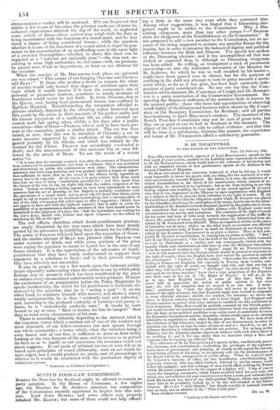M. DE TOCQUEVILLE.
TO THE EDITOR OF THE SPECTATOR. TO THE EDITOR OF THE SPECTATOR.
Paris. 7th February 1843.
SIR—The translation which appeared of Lord BROUGHAM'S speech on the first night of your session, ascribes to his Lordship some expressions in relation to M. DE TOCQUEV/LLE, which would lead to the inference of his having met with an imperfect version of that gentleman's speech on the Address in the French Chamber of Deputies. To those who heard or are otherwise informed of what he did say, it would seem impossible to invest his speech with any thing like the character of a mis- chievous animosity towards England. Be stated, it is true, the existence of a settled dissatisfaction in the minds of his countrymen, which, instead of re- prehending, he admitted to be legitimate: but so far from desiring to see this feeling expand into hostility, the very basis of his attack against M. GUIZOT was, that it was imprudent in the Minister to open negotiations with England on a subject so likely to provoke fresh irritation as the right of search. AL DE TOCQUEVILLE allowed that the obligation under which M. GUIZOT was placed by the Chamber, of refusing the ratification of the treaty, had its rise in the alien- ated feelings of the Members towards England, backed by the public out of doors. He considered that any overture towards alliance with England under such circumstances was unwise and hazardous. The existence of the right of search for ten years had been of little avail towards the suppression of the traffic in slaves; the number of whom annually carried across the Atlantic had been ad- mitted by M. GASPARIN to be 200,000. Thus, no important service to the cause of humanity was at issue; whilst, on the other hand, an occasion was afforded to the representative body of France to mark its displeasure at not being con- sulted by the Executive Government in so grave a matter. They in fact sub- jected M. GUIZOT to humiliation, by forcing him to refuse to ratify. " But," said M. DE TOCQUEVILLE, "this was the fault of the Executive, which ventured to treat its Parliament as a nullity, and was consequently visited with the penalty which such institutions as ours have in store for Ministers who submit to be the organs of another's will. "Again," urged M. DE TOCQUEVILLE, "is it at this moment that the French nation should be pressed to acquiesce in the right of search, when the English have just waived the question as regards the Americans ? " 1 believe," said the orator, "that under the actual state of feeling in France and England, but especially in France, these treaties con- nected with the right of search are fraught with risk, and that one day or other they will lead to a rupture." "All those," he adds shortly after, "who surround me on those benches,* know that a large proportion of the Deputies owe their seats to the cry of 'No Right of Search.' I will go so far as to say, that England herself is aware of this fact : well, she never fails to appreciate the action of public opinion in her own case ; she will not complain that we respect it on our side. I main- tain," continued he, "that the slave-trade will never be put down by means of the right of search, but that England ought to be invited to cooperate in more effectual schemes : abolish the market, for instance : no slaves are taken to French colonies, because the sale is there illegal. Let England and France combine to prevail with other nations to establish the like conditions in their dominions. This effort would be cordially seconded by the French people, and would involve no international jealousies between these two great nations. But the bane of our political condition is an entire want of conformity between the Executive Government and the Assembly, which entails upon us an obvious inferiority in negotiations with other European powers. We have need of all the influence of this Chamber, backed by that of our Government, in order to maintain our dignity as regards other nations around us ; therefore, to act in different directions is voluntarily to enfeeble our position. Yet so long as the Ministry and the Chamber pursue objects at variance with each other, there is no avoiding it ; and I, for one, advise that we therefore adopt a firm and vigorous tone in framing our address," &c. The substance of M. DE TOCQUEVILLE'S speech, in fine, was distinctly peace. able, humane, and constitutional; vindicating the privileges of the represen- tative form of government, and glancing, as closely as his regard for conven- tional forms allowed of his doing, at the primary evil, viz, the predominance of the Royal will in the management of public affairs. When he touched upon M. GU1ZOT'S tenacity of office, his late humiliation notwithstanding, be pointedly observed, that any other Cabinet, fettered by similar causes, would follow his example ; and that a change of men would effect nothing for France whilst Ministers consented to be the organs of a higher will. I beg of you to insert the foregoing comments, which 1 have rendered brief for your sake, but which may nevertheless aid your countrymen to form a more just estimate than
Lord BROUGHAM has done of our distinguished Deputy, whose rare qualities cause him to be peculiarly looked up to by the well-minded of his fellow citizens. He is not "Anti-British," but deeply sensible of national honour, and, as such, not an admirer of the " Pais a tout prix."
Your obedient servant,
• Looking at the Gauche and Centre. D LA M. E


























 Previous page
Previous page